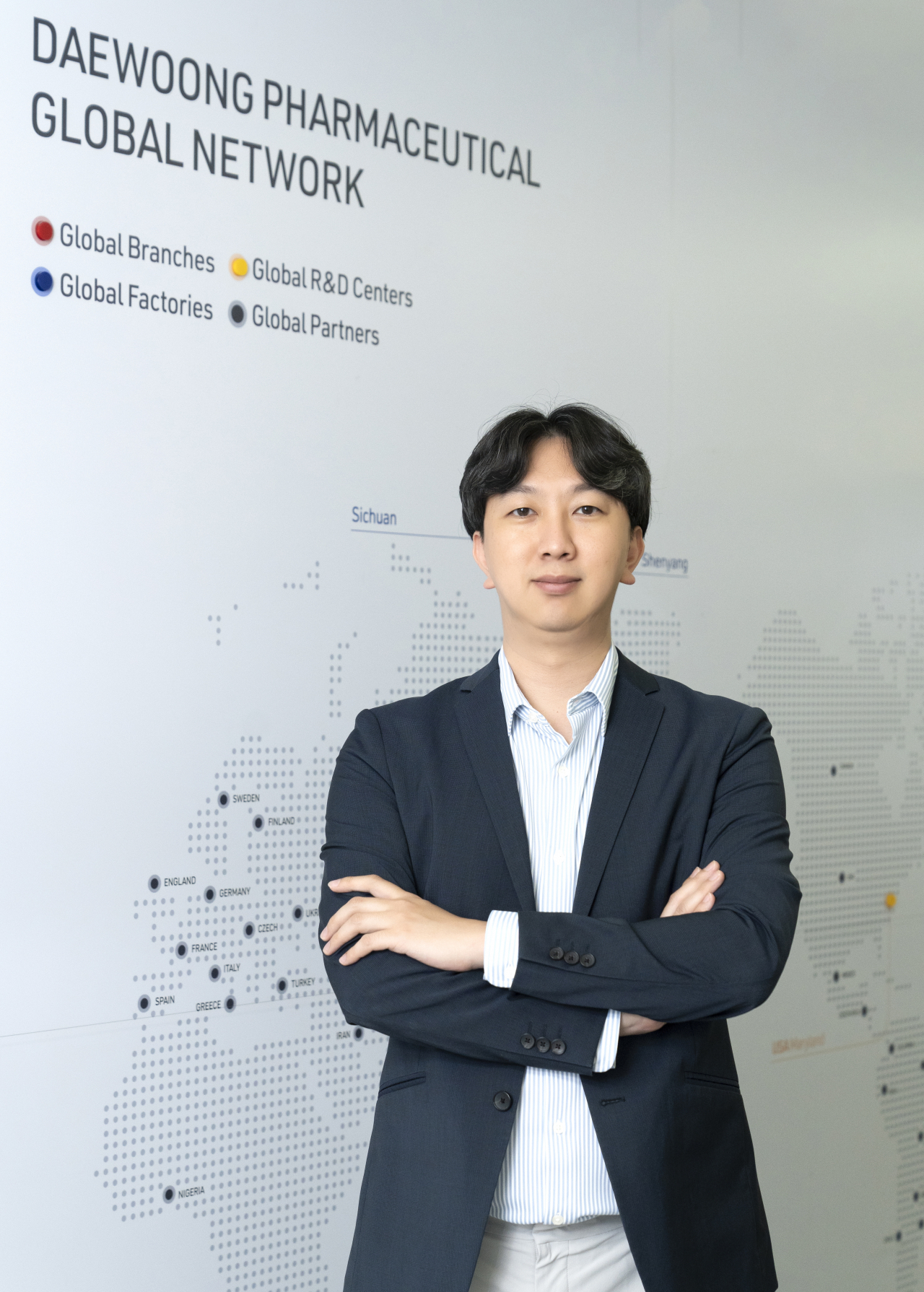
Korea’s leading pharmaceutical firm Daewoong Pharmaceutical aims to achieve a fivefold increase in overseas sales within the next five years through the introduction of new drugs, according to the company's global business head on Friday.
“My personal goal is to see Daewoong’s overseas sales reach 1 trillion won ($772.6 million) within the next five years,” said Kim Do-young, head of Daewoong Pharmaceutical's Global Business Development Center, during an interview with The Korea Herald.
Kim's confidence to set such an ambitious goal comes after the success of the company's newly launched drugs, a gastroesophageal reflux disease treatment called Fexuclue and a diabetes treatment called Envlo.
“The company is currently waiting for approval from the Chinese government” for Fexuclue, Kim said. When approved, Fexuclue will account for the largest slice of the global gastroesophageal reflux disease treatments market estimated at over 3 trillion won. Kim added that Daewoong is also aiming to find a new partner for Fexuclue’s launch in the North America region.
In terms of Envlo, a member of the SGLT-2 inhibitor drug class, Kim noted Daewoong will increase research and development of diabetes treatments as it has a variety of applications for patients with kidney and heart diseases, as well as myocardial infarction, obesity, liver diseases and glaucoma.
Daewoong has seen a significant increase in its sales in overseas markets. In the first quarter of this year, its overseas sales jumped by 54.2 percent on-year, reaching 55.6 billion won.
In 2022, Daewoong posted 185 billion won in sales from overseas markets, up 56.9 percent from the year before.
Previously, Daewoong Pharmaceutical focused on the domestic market, but has recently shifted its sights to the international stage. A major transformation has been made within the company to grow its overseas business, particularly after the success of its botulinum toxin product Nabota, which is currently sold in over 60 countries.
“After getting involved in the regulatory processes of Nabota both in South Korea and abroad, I thought that the company should plan ahead to speed up the process of launching new treatments in overseas markets,” Kim said.
In 2019, Kim established the Global Business Development Center and combined separate units that were in charge of out-licensing, regulatory affairs and new drug development in foreign countries. Under Kim’s command, the center started to prepare for overseas launches in the early stages of drug development. The overseas launches of Envlo and Fexuclue were also decided when they were still in the initial phase of their clinical trials, Kim explained.
“We decided on the countries where we will launch those treatments and prepared the paperwork accordingly,” Kim said.
As a result, Daewoong Pharmaceutical was able to submit new drug applications for Fexuclue in 12 countries within a year of its domestic launch in 2022. The company currently aims to receive approvals in 20 countries by 2025 and 100 countries by 2027, he added.
Morocco, a relatively unfamiliar market to South Korean pharmaceutical firms, is just one of the destinations planned for Fexuclue.
“Cooper Pharma, a leading pharmaceutical firm in Morocco, showed enthusiasm for selling (Fexuclue),” Kim explained.
Kim said having a dedicated partner is crucial when launching new drugs in overseas markets. “What is important is actually putting our products on shelves at pharmacies, not the money the company receives from out-licensing," Kim said. “Out-licensing is merely one of steps or tools that a company can take to introduce its products in the overseas market, but never the end.”
Kim said the total amount of money that local pharmaceutical firms made through out-licensing deals reached around 30 trillion won between 2019 and 2021, quoting a report from the Korea Pharmaceutical and Bio-Pharma Manufacturers Association. But deals worth 10 trillion won had later been called off, forcing local pharmaceutical firms to find new partners who will go through clinical trials again.
Kim said Daewoong is exercising more discretion in out-licensing, finding dedicated partners and putting joint efforts in clinical trials to actually deliver its products in foreign markets.
To find better partners and improve its global network, Daewoong has continued to invest resources to promote the company and its products, Kim said.
International pharma industry events like the Convention on Pharmaceutical Ingredients (CPHI), the JPMorgan Healthcare Conference and the BIO International Convention have been venues for Daewoong to forge new partnerships.
According to Kim, international perception of Daewoong has changed significantly in recent years to the extent that foreign companies, like Cooper Pharma, have reached out first to make an offer to the company.
Previously at the CPHI, Daewoong Pharmaceutical had difficulties attracting clients, Kim said. Kim himself had to make visits to booths set up by foreign players. However, after years of global promotion, foreign clients started to visit Daewoong's booth at the CPHI, said Kim, who has spearheaded Daewoong’s participation in the convention for more than 10 years.
According to a Korea Health Industry Development Institute survey involving 9,120 customers and 365 experts in 19 foreign countries between October and November 2022, Daewoong was the second-most popular Korean pharmaceutical brand, following Samsung Biologics.


![[Music in drama] Rekindle a love that slipped through your fingers](http://res.heraldm.com/phpwas/restmb_idxmake.php?idx=645&simg=/content/image/2024/05/01/20240501050484_0.jpg&u=20240501151646)

![[New faces of Assembly] Architect behind ‘audacious initiative’ believes in denuclearized North Korea](http://res.heraldm.com/phpwas/restmb_idxmake.php?idx=645&simg=/content/image/2024/05/01/20240501050627_0.jpg&u=20240502093000)
